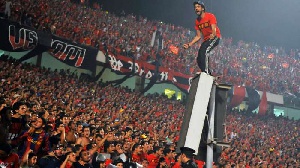 Egyptian football fans at the stadium
Egyptian football fans at the stadium
There is a quantum of solace to be found in the reality that, in this most atypical of years, the showpiece event of African club football will be contested by the continent’s two most successful entities.
If a disc-shaped dirigible flying vessel were to land on Earth, bearing sentient beings from a far-flung planet in the vast void of space, and they demanded (or even asked nicely) a crash course in all that the Caf Champions League is about, they would not get a better answer than Al Ahly vs Zamalek.
The stakes are not quite as galactic as this scenario depicts, but the importance and scale of this game are not off by much.
Understand, this is less a rivalry between football clubs and more an ideological, almost political divide. In a world increasingly stripped of individualism, these two behemoths exist as the basis of social identity in Egypt; one is either an Ahly supporter or a Zamalek supporter.
So strong is the feeling on both sides that even Mohamed Salah, his country’s most iconic footballing star, has balked at stating his preference clearly, and instead voted for an engaging final in a recent interview.
After all, the history of the Cairo derby has been fraught with suspicion, recrimination, conspiracy theories and even violence.
So hot has the fire of its fervour been that, in one famous instance in December 1971, the entire league season was caught in the blaze after the award of a penalty to Zamalek caused Ahly fans to storm the pitch in protest.
Five years prior, the fire was of a literal variety, with a section of the stadium burnt during the derby as fans, spurred on by the dissent of Ahly fans, ran amok.
In 2003, Ahly lost the title on the final day of the league season, and to this day there are some who claim it was at the behest of high-ranking government officials, who favoured Zamalek and order their players to throw the ultimate match against ENPPI.
When both sides met in the Super Cup in February, there ensued a brawl following the White Knights’ penalty shoot-out victory, and come to their league meeting a few days later, the victors forfeited in protest against sanctions imposed (on both teams) by the Egyptian Football Association (EFA).
Not even the practise – dating back to 1956 – of having foreign referees officiate has done much to quell misgivings; for all the fans know, the whole world is split along the same lines as they are. Knowing this then, it is no surprise that when Caf named Ahly the club of the 20th century, Zamalek who immediately alleged bias, challenging that claim on the grounds they had won more continental titles overall.
It is this depth of feeling, this intensity, this constant striving for one-upmanship that will come to a head-on Friday night when Ahly and Zamalek grapple in what has been termed the Final of the Century (this is supposed to function as a belated “tie-breaker”, essentially).
That its culmination – despite winning 13 Caf Champions League titles and appearing in 19 finals between them, they have never before crossed paths in the Final – will take place inside an empty Cairo Stadium is the cruellest irony. Due to Covid-19 restrictions and in the interest of public safety, Caf and the EFA released a joint statement to this effect two days ago.
Especially considering there was a real danger of cancellation at one point, this will certainly do just fine—better half a loaf than none at all. It might also, in all honesty, be for the best. In the current circumstances, the absolute last thing Caf would want to deal with is controversy and insecurity in its showpiece club final with the world watching, especially in a week that has seen its president indicted by Fifa’s Ethics Committee.
The outbreak of the coronavirus pandemic also effectively threw the 2019/20 Champions League out of kilter, scuppering plans to transition to an August-May schedule and requiring the host city to be changed from Douala to Cairo (and that only determined by the outcomes of the semi-finals, which only took place in October).
As such, an empty stadium is perhaps not the worst compromise to make.
The focus now will be solely on the players, and it is they who must carry the occasion, interpreting their coaches’ tactical plans to create an engaging spectacle.
For Ahly, coach Pitso Mosimane faces a significant amount of pressure, having been brought in from Mamelodi Sundowns at great expense. His success has a lot riding on it, not least of all the prospects of coaches from sub-Saharan Africa, to whom the doors to the bigger clubs in North Africa have mostly been closed. Victory here would not only keep him in the job, but could completely reform the culture of African club football.
So far, the reviews of his work have been largely positive, and Ahly will enter as favourites. The Red Devils turned over Wydad Casablanca in impressive fashion in the semis and can call upon the excellent Ali Maaloul, one of the finest left-backs on the continent, as well as Hussein El Shahat and Marwan Mohsen in the attack.
Portuguese Jaime Pacheco leads Zamalek, back for a second stint after his first six years ago. In Achraf Bencharki and Mostafa Mohamed, he possesses an all-star front line; through the competition, Zamalek has not won a game without either of these two scorings.
Beyond Covid, beyond a rivalry that defines a city and rocks a nation, beyond the murky politics of Caf, this is ultimately what this comes down to. The two finest sides on the continent, brimming with attacking talent; one with a more collectivist ideal to its play, the other with a blockbuster front line.
Against all vicissitude, football will, hopefully, be the big winner.